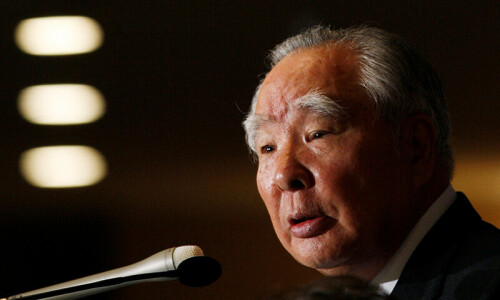ISLAMABAD: The government on Wednesday formally announced the Alternative and Renewable Energy (ARE) Policy 2020 that offers generous tax facilities to investors and promises induction of power plants on open competitive bidding for lowest tariff and technology transfer.
Speaking at a news conference with Minister for Science and Technology Fawad Chaudhry, Minister for Energy Omar Ayub Khan said the policy, approved in a recent meeting of the Council of Common Interests, targets increasing the share of ARE in total power supply to 20 per cent by 2025 and 30pc by 2030 from about 5pc at present.
He said hydropower would soon be included in the ARE category under which its share would increase to 60pc of power generation by 2030. Coupled with Thar coal and nuclear power, the total share of power generation from indigenous sources would reach 75pc, he said.
Mr Khan hoped the induction of power plants on open competitive bidding would bring down solar and wind tariff to less than four cents per unit and ultimately benefit the industry and domestic investments in localisation of solar panels, wind turbines and related equipment and material.
Special Assistant to the Prime Minister on Petroleum Nadeem Babar said the new ARE policy had five key features that were different from past policies. Firstly, the fundamental change from existing power policies was that investment would be solicited on competitive bid for lowest cost instead of upfront or cost-plus based tariff under all previous power policies, he said.
Secondly, the federal government would decide on annual and three-year basis about the quantity of additional power requirement as before but it would be decided jointly by the four provinces, Azad Jammu & Kashmir and Gilgit-Baltistan at a steering committee as to how much share be allocated to solar, wind, waste to energy or other technology and what should be their location.
Third, the currency devaluation factor would be taken care of in bids for tariff. The indexation would be treated as cost of tariff because the one of the major reasons behind tariff increase in the past were unlimited dollar indexation, the SAPM explained.
Fourthly, the policy gives incentives for technology transfer for local manufacturing of solar panels, wind turbines and all related equipment for job creation for which Ministry of Science and Technology was finalising quality standards. Babar said three top Chinese companies and a leading European manufacturer had approached the government for setting up of manufacturing units for solar and wind equipment.
Fifth, he said bidding would be based on two to three year forward looking energy requirements and on ‘take and pay basis’ without allowing capacity payment price to ensure that tariff is paid only for the electricity purchased and not for capacity availability.
He said the import of equipment, machinery and manufacturing material would be exempted from custom duty or import duties and investments would be exempt from income tax and only withholding tax on dividends would be applicable. Wind and solar tariff had already come down to 4-4.5cents per unit and hoped it would go below 3.5cents per unit after bidding, he added.
On the occasion, Chaudhry said Chinese companies were interested in relocation of their factories to Pakistan because of US-China trade war and the country was set to take a major benefit in the shape of manufacturing growth.
He alleged that there was an import mafia which was making local production expensive and imported cheaper by charging zero-tax on furnished imported good and heavy tax on raw material. He further alleged that import of solar panels had earlier been used for money laundering and hence the Chinese government had been persuaded to provide import product certification.
Under the new ARE policy, duties/tax structure has been revised and now there is zero-tax on the equipments for renewable energy. This will help to attract the Chinese companies’ relocation to Pakistan.
Chaudhry said that when Covid-19 started Pakistan was importing every Covid related supplies from abroad. Now within few months Pakistan has become a major exporter of the Covid-19 supplies, he added. He said that within one year Pakistan will establish its own industry for the production of renewable energy equipments locally.
Babar said the strategic objective of the policy was energy security, affordability of electricity, availability for all and environmental protection for sustainable development.
The policy seeks to expanded scope to all alternative and renewable energy sources, competitive procurement and addresses areas like distributed generation systems, off-grid solutions, B2B methodologies and rural energy services.
Published in Dawn, August 13th, 2020















































